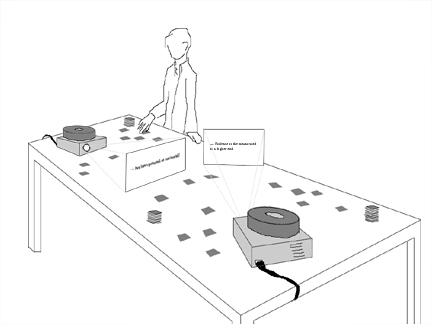
"Substratum" is a continuation of the projects "Interim" and "Parallax."
Projected continuously as text slides (on translucent glass plates), dialogues evolve among an unknown number of individuals, one of them a female character that that is positioned in space through a set of staged remarks. The conversations — sometimes mere statements not necessarily meant for being responded to — circle around different historical and contemporary conceptions of land/home/property/territory that follow different genealogies with a particular focus on the traditions of Judaism, Christianity and Islam. The complicated notions of entitlement in terms of land are addressed by relating the different traditions to each other, arguing in their respective logic. The format of the dialogue developed out of the immanent dialectic of the topic as well as the consideration of the role that spoken word plays in religious knowledge and truth.
On the table itself lies a "Memory Game." The game consists of 100 cards, 50 red, 50 brown, each having an image on one side. That side is facing down. A sign describes the rules of the game: In every round, on her/his turn, each player turns around two cards -- one red, one brown. The red cards will show figures, the brown cards landscapes. The goal of the game is to find matching pairs. If the player finds "a match" she/he can take both cards and stack them up. If the cards don't match, they will be flipped back to their upside down position. Each time a card is opened it is important that all players memorize the location of the respective landscapes/figures for future matches.
Based on an existing children game, the game plays with the impossible task to match "a land" to "a people." Territory, with its resources and cultural implication, is an underlying principle of every modern nation-state. Often universal perceptions of the right to land originates with or are justified by religious terms. I am interested in recognizing religious norms that inform our understanding of what we call "home," to question the resulting entitlements.
Projected continuously as text slides (on translucent glass plates), dialogues evolve among an unknown number of individuals, one of them a female character that that is positioned in space through a set of staged remarks. The conversations — sometimes mere statements not necessarily meant for being responded to — circle around different historical and contemporary conceptions of land/home/property/territory that follow different genealogies with a particular focus on the traditions of Judaism, Christianity and Islam. The complicated notions of entitlement in terms of land are addressed by relating the different traditions to each other, arguing in their respective logic. The format of the dialogue developed out of the immanent dialectic of the topic as well as the consideration of the role that spoken word plays in religious knowledge and truth.
On the table itself lies a "Memory Game." The game consists of 100 cards, 50 red, 50 brown, each having an image on one side. That side is facing down. A sign describes the rules of the game: In every round, on her/his turn, each player turns around two cards -- one red, one brown. The red cards will show figures, the brown cards landscapes. The goal of the game is to find matching pairs. If the player finds "a match" she/he can take both cards and stack them up. If the cards don't match, they will be flipped back to their upside down position. Each time a card is opened it is important that all players memorize the location of the respective landscapes/figures for future matches.
Based on an existing children game, the game plays with the impossible task to match "a land" to "a people." Territory, with its resources and cultural implication, is an underlying principle of every modern nation-state. Often universal perceptions of the right to land originates with or are justified by religious terms. I am interested in recognizing religious norms that inform our understanding of what we call "home," to question the resulting entitlements.